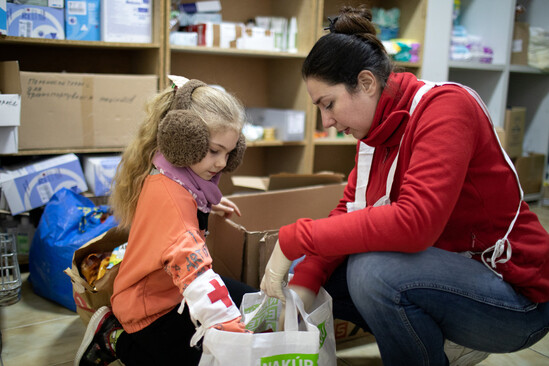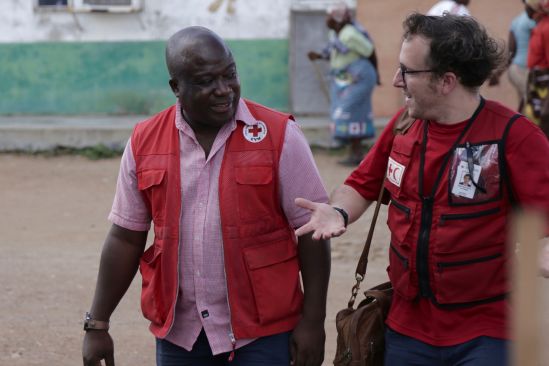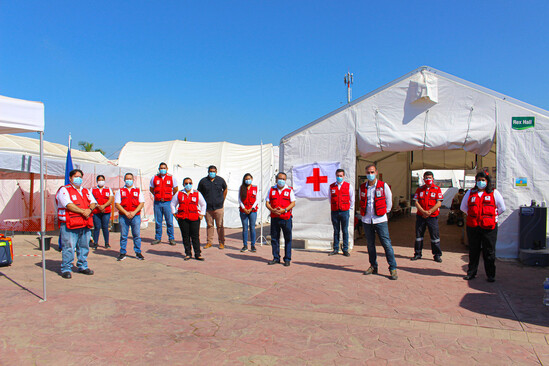Emergency Response
Donate to the International Disaster Relief Fund
Responding to emergencies around the world
From Haiti to Nepal, from Mozambique to Ukraine, the Canadian Red Cross works with our local Red Cross and Red Crescent Movement partners to help people around the world who are impacted by emergencies, protracted crises and conflicts. We maintain a variety of tools that enable us to respond quickly and effectively when our Movement partners need.
The Canadian Red Cross is part of the international Red Cross Red Crescent Movement, the world’s largest humanitarian network. When an emergency happens that overwhelms local capacity, National Societies can respond in a variety of ways to provide humanitarian aid. This includes health, relief supplies, water and sanitation, and funding, to name a few – and as a Movement, we work to support this response through our respective tools. Our international response is always coordinated with the local National Society, the International Federation of Red Cross and Red Crescent Societies (IFRC) and/or the International Committee of the Red Cross (ICRC), depending on the type and location of the response. In all cases, the Canadian Red Cross strives to have our responses be as local as possible and only as global as necessary.
Canadian Red Cross response tools
Funds

(Photo credit: Marko Kokic / IFRC)
When an emergency strikes, sending funds to support the emergency response teams of our Red Cross Red Crescent Movement partners is often the quickest way to ensure help gets to the people who need it. By coordinating through our Movement mechanisms, we are able to send funds quickly to reinforce the work already being done on the ground. This can be done for emergencies of all sizes, even those that don’t make headlines here in Canada.
Relief supplies

(Photo credit: Michelle Andrea-Girouard / Canadian Red Cross)
The Canadian Red Cross maintains essential emergency relief supplies in warehouses in Canada and the United Arab Emirates. Items such as tarpaulins, jerry cans, kitchen sets, hygiene kits and blankets can be quickly mobilized from the closest location when an emergency happens and distributed to people impacted. When an emergency overwhelms local systems and items can’t be purchased locally or regionally, bringing in pre-positioned supplies is the fastest way to ensure people get the help they need.
Humanitarian experts

(Photo credit: Joseph Leger / Canadian Red Cross)
The Canadian Red Cross has rosters of highly trained humanitarian experts who can manage operations and provide technical expertise when emergencies happen. Our humanitarian experts come from a variety of backgrounds, and the Canadian Red Cross has particular strength in sending operational leadership and health experts to support responses around the world. This might include medical professionals, public health experts or operations managers. The Canadian Red Cross also supports regional humanitarian experts to respond to emergencies in their own backyards.
Learn more about becoming an international humanitarian expert.
Humanitarian health services

(Photo credit: Honduran Red Cross)
For over a decade, the Canadian Red Cross has developed a strong capacity to support health emergency responses, including field hospitals and mobile clinics. This capacity has supported after a number of international emergencies, including Honduras after Hurricanes Eta and Iota in 2020, Haiti after Hurricane Mathew in 2016 and Nepal after the 2015 earthquake.
This requires a variety of sophisticated tools, personnel, systems and procedures that are maintained to be deployed as quickly as possible when the need arises. These items can be configured to offer a variety of services that can be delivered directly to people impacted, including mental health and psychosocial support, mobile and fixed clinics, and public health support.
When we send these tools, we work closely with the local National Society and other Movement partners to hand over the equipment and knowledge so they can re-deploy for future emergencies.
How our work is funded
Public appeals: donations to public appeals for specific emergencies provide essential emergency funds for the Canadian Red Cross to support our international partners. Learn more about open public appeals.
International Disaster Relief Fund (IDRF): The IDRF allows the Canadian Red Cross to support life-saving activities within hours of an emergency, well before any money has been received from supporters. It also allows us to implement disaster preparedness programs to create stronger and more resilient communities. Learn more about how generous donations to IDRF have made a difference.
Government of Canada support: We’re grateful for our continued partnership with the Government of Canada, who supports our ability to respond and mobilize funds, personnel, emergency stocks and health services.
